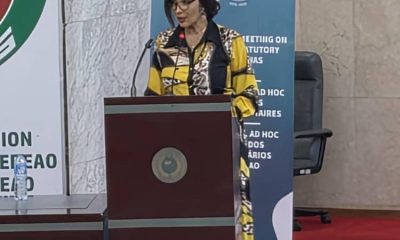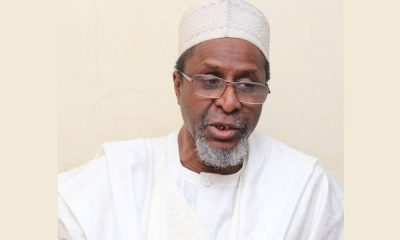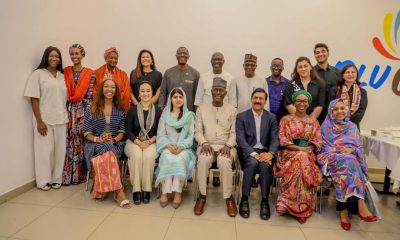NATIONAL NEWS
Nigeria Validates Revised National Migration Policy With UN Support

The Nigerian government, in collaboration with the United Nations’ International Organisation for Migration (IOM), has officially validated the Revised 2024 National Migration Policy and its Integrated Implementation Plan in Abuja.
The event on Tuesday marked the end of months of multi-stakeholder consultations with government agencies, international partners, and civil society organisations.
The updated policy reflects Nigeria’s commitment to leading migration governance efforts in Africa by aligning national strategies with global frameworks such as the Global Compact for Safe, Orderly, and Regular Migration, the Sustainable Development Goals (SDGs), and the African Union’s Migration Policy Framework.
“This policy is the result of rigorous consultations, late-night research, and inter-agency collaboration,” said IOM Nigeria’s Chief of Mission, Sharon Dimanche.
“It is more than just technical validation; it is a reaffirmation of Nigeria’s leadership in developing inclusive and globally aligned migration systems.”
The revised policy comes at a time when global migration trends are rapidly shifting. With over 281 million international migrants and remittances to low- and middle-income countries expected to reach $669 billion by 2023, migration is a key development driver.
Nigeria, which received an estimated $19.5 billion in remittances last year, relies heavily on these funds to meet basic household needs such as education, healthcare, and employment.
Aliyu Tijani Ahmed, Director General of the National Commission for Refugees, Migrants, and Internally Displaced Persons (NCFRMI), emphasised the policy’s responsiveness to both national and global migration dynamics.
“We need adaptive and inclusive frameworks to address modern migration challenges such as climate-induced displacement, irregular migration, and the protection of vulnerable populations,” he stated.
Ahmed explained that the revised policy was developed through a structured review process led by a 19-member committee and guided by the United Nations Network on Migration’s six-step implementation approach.
Hon. Abike Dabiri-Erewa, Chairman of the Nigerian Diaspora Commission (NiDCOM), emphasised the importance of addressing the plight of Nigerian migrants abroad, citing the recent rescue of 231 trafficked Nigerians from Ghana.
“Migration is not a crime,” Dabiri-Erewa said. “We must do more to keep our citizens safe from exploitation and abuse.” This policy cannot simply exist on paper; it must actively guide public awareness campaigns and cross-border interventions.”
The updated policy prioritises better coordination among government agencies, better migration data governance, climate resilience strategies, diaspora engagement, and legal migration pathways.
Dimanche emphasised that effective coordination remains critical to implementation. “Nigeria has demonstrated that coordinating efforts across ministries and sectors is not only possible, but necessary for success,” she added.
The IOM’s technical assistance and funding, provided through the Migration Multi-Partner Trust Fund, were critical in the development of the new policy, ensuring inclusivity and compliance with international standards.
The next step is to secure approval from the Federal Executive Council, after which the policy will guide Nigeria’s migration agenda in the coming years.
“The presence of all stakeholders here today demonstrates our shared vision.” Together, we can create a migration system that is humane, coordinated, and development-oriented,” Ahmed concluded.
-
CRIME4 years ago
PSC Dismisses DCP Abba Kyari, To Be Prosecuted Over Alleged $1.1m Fraud
-
FEATURED4 years ago
2022 Will Brighten Possibility Of Osinbajo Presidency, Says TPP
-
FEATURED2 years ago
Buhari’s Ministers, CEOs Should Be Held Accountable Along With Emefiele, Says Timi Frank
-
BUSINESS & ECONOMY2 years ago
Oyedemi Reigns As 2023’s Real Estate Humanitarian Of The Year
-
SPORTS2 years ago
BREAKING: Jürgen Klopp Quits Liverpool As Manager At End Of Season
-
SPORTS2 years ago
Could Liverpool Afford Kylian Mbappe For €200 million? Wages, Transfer Fee
-
ENTERTAINMENT2 years ago
Veteran Nigerian Musician, Basil Akalonu Dies At 72
-
FEATURED2 years ago
Tribunal Judgement: Peter Obi Warns Of Vanishing Electoral Jurisprudence, Heads To Supreme Court
-
BUSINESS & ECONOMY2 years ago
Oyedemi Bags ‘Next Bulls Award’ As BusinessDay Celebrates Top 25 CEOs/ Business Leaders
-
FEATURED3 years ago
2023 Presidency: South East PDP Aspirants Unite, Demand Party Ticket For Zone

































